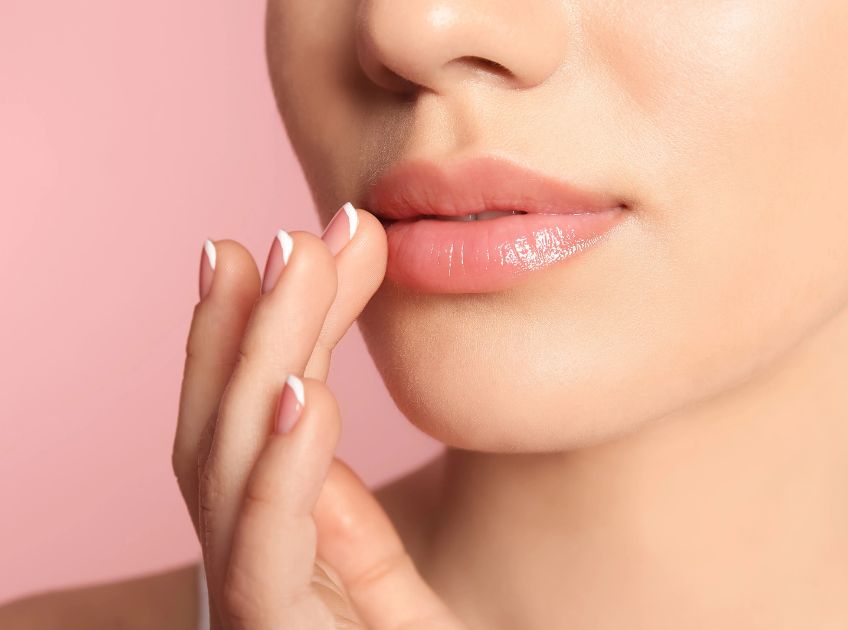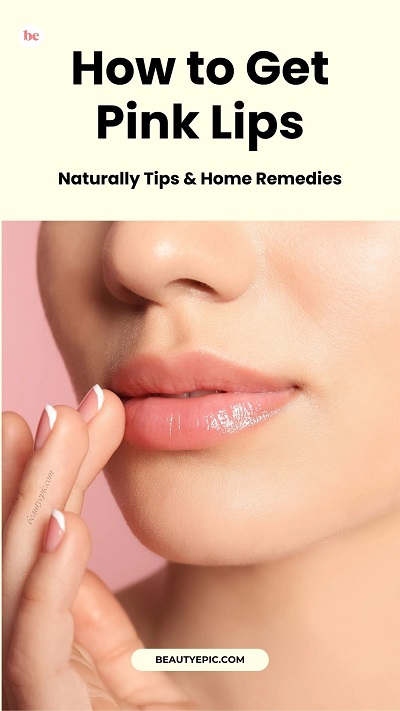
Important: This article is for informational purposes only. Please read our full disclaimer for more details.
Your lips are one of the most delicate and expressive features of your face. Unlike the rest of your skin, lips have no oil glands, which makes them more prone to dryness, discoloration, and environmental damage. While lipsticks and tints can give temporary color, naturally pink lips are a sign of hydration, good circulation, and proper care. The good news? With the right habits and natural remedies, you can bring back your lips’ natural rosy glow.
What Causes Dark Lips?
Before learning how to make lips pink, it’s important to understand why lips darken in the first place. Common causes include:
- Smoking – Nicotine and tar reduce oxygen supply to the skin, causing discoloration.
- Excess Sun Exposure – UV rays stimulate melanin production, darkening the lips.
- Dehydration – Lack of water leaves lips dry, cracked, and dull.
- Excess Caffeine or Alcohol – Both can dehydrate the skin, leading to pigmentation.
- Poor Diet & Vitamin Deficiency – Lack of iron, vitamin B12, or folate can cause pale or dark lips.
- Allergic Reactions – Low-quality lipsticks or flavored lip balms can trigger irritation.
- Genetics – Some people naturally have darker lips.
A study in the Indian Journal of Dermatology highlights that lifestyle and environmental factors are leading causes of lip pigmentation (1).
10 Natural Remedies to Make Lips Pink and Soft
1. Honey and Sugar Scrub
- How to Use: Mix 1 teaspoon of sugar with ½ teaspoon of honey. Gently rub this mixture on your lips for 1–2 minutes, then rinse with lukewarm water.
- Why It Works: Sugar exfoliates dead cells while honey deeply hydrates and has antibacterial properties. A study in the Journal of Cosmetic Dermatology notes honey improves skin healing and moisture retention (2).
2. Beetroot Lip Stain
- How to Use: Extract fresh beetroot juice and apply it to your lips before bed. Wash off in the morning.
- Why It Works: Beetroot contains betalains—natural pigments that give lips a rosy tint and antioxidants that reduce pigmentation.
3. Aloe Vera Gel
- How to Use: Apply fresh aloe vera gel directly on your lips and let it absorb. Repeat daily.
- Why It Works: Aloe vera soothes, heals cracks, and reduces pigmentation. Research in Phytotherapy Research (2019) confirms its role in skin hydration and wound healing (3).
4. Rose Petal and Milk Remedy
- How to Use: Soak a few rose petals in milk for an hour, grind them into a paste, and apply to lips for 15 minutes before rinsing.
- Why It Works: Rose petals naturally enhance pinkness while milk’s lactic acid gently lightens dark spots.
5. Coconut Oil Overnight Therapy
- How to Use: Massage 2–3 drops of coconut oil into your lips before sleeping.
- Why It Works: Coconut oil has fatty acids that hydrate deeply and create a natural protective barrier. A study in Dermatitis Journal shows coconut oil improves skin barrier function (4).
6. Pomegranate Lip Mask
- How to Use: Crush pomegranate seeds, mix with a little milk cream, and apply for 10–15 minutes before rinsing.
- Why It Works: Pomegranate contains polyphenols that improve circulation and restore natural lip color.
7. Cucumber Slice Therapy
- How to Use: Rub a chilled cucumber slice over your lips for 5 minutes daily.
- Why It Works: Cucumber is rich in water and vitamin C, which hydrates and lightens pigmentation.
8. Almond Oil and Lemon Mix
- How to Use: Mix 3–4 drops of almond oil with 1 drop of lemon juice. Massage gently and leave overnight.
- Why It Works: Almond oil nourishes and softens while lemon reduces discoloration. Use sparingly as lemon can be strong.
9. Turmeric and Milk Paste
- How to Use: Mix a pinch of turmeric with 1 teaspoon of milk. Apply the paste on the lips for 5 minutes, then wash off.
- Why It Works: Turmeric reduces pigmentation and inflammation, while milk naturally brightens. Studies highlight turmeric’s antioxidant and skin-lightening effects.
10. Shea Butter Lip Balm
- How to Use: Apply pure shea butter to lips 2–3 times daily.
- Why It Works: Shea butter is rich in vitamins A and E, which heal chapped lips and lock in moisture. Research in Lipids in Health and Disease confirms its role in improving skin hydration (5).
Pro Tip: For best results, combine a weekly exfoliation routine (sugar + honey or turmeric + milk) with daily moisturization (coconut oil, shea butter, or aloe vera).
Habits You Should Avoid for Naturally Pink Lips
If you want to maintain naturally healthy lips, steer clear of:
- Licking your lips – Saliva dries them out further.
- Using harsh cosmetics – Low-quality lipsticks can cause chemical pigmentation.
- Smoking & vaping – Both darken lips significantly.
- Over-exfoliating – Too much scrubbing damages the thin skin barrier.
Foods That Boost Lip Health from Within
What you eat directly reflects on your lips. Include these in your diet:
- Iron-rich foods – Spinach, lentils, and lean meats prevent pale lips.
- Vitamin B-complex – Nuts, eggs, and whole grains support skin health.
- Vitamin C-rich fruits – Oranges, strawberries, and kiwi help reduce pigmentation and promote collagen.
- Hydrating foods – Watermelon and cucumber keep lips plump.
Studies in the Nutrients Journal emphasize that vitamin-rich diets improve overall skin tone and hydration, including the lips (6)(7).
Are Naturally Pink Lips a Sign of Health?
Yes—pink lips are often associated with good circulation, hydration, and balanced nutrition. Pale lips, on the other hand, may signal anemia, while dark lips may indicate dehydration, sun exposure, or smoking habits.
Why Do Lips Suddenly Turn Very Pink?
Sometimes lips appear unusually bright pink or red due to:
- Increased blood circulation (after exercise or spicy food).
- Allergic reactions (to lip products or food).
- Hormonal fluctuations that temporarily increase blood flow.
If lips remain excessively red or inflamed, it may be a sign of irritation or a skin condition that requires medical attention.
Frequently Asked Questions (FAQ’S)
1. Can lemon lighten dark lips?
A. Yes, lemon has mild bleaching properties due to citric acid, but it can be harsh. Always dilute with honey or apply sparingly to avoid irritation.
2. How often should I exfoliate my lips?
A. Once or twice a week is enough. Over-exfoliation can make lips sensitive and dry.
3. Do lip balms with SPF work?
A. Yes. SPF-based lip balms protect lips from UV-induced pigmentation and premature aging. Reapply every 2–3 hours if outdoors.
Final Thoughts
Pink lips are more than just a beauty standard—they reflect good health and proper care. By staying hydrated, eating a nutrient-rich diet, protecting your lips from the sun, and avoiding damaging habits like smoking, you can restore your natural beauty. Add simple home remedies like beetroot, aloe vera, and natural oils to your routine, and you’ll notice your lips becoming softer, healthier, and naturally pink over time.
















